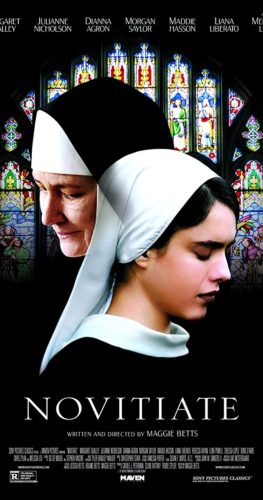Novitiate Screening and Q&A at LAFS
Director Maggie Betts Makes Her Feature Debut
Check out our brief recap of our screening of Novitiate, and Q&A with Jeff Goldsmith, producer of The Q&A with Jeff Goldsmith.
Did you go to Film School?
I never studied at film school, but wish I had. I studied film theory at Princeton. Created a documentary first, and then a short film.

Novitiate – Courtesy of Maven Pictures
When you say you studied film theory, what popped out to you?
Film theory has been my great passion and obsession. During school and after school, it has been a huge focus of mine. It is about the layers of storytelling, and how much the image is communicating to you. I feel like a film should be able to be understood without dialogue. All of the things you are looking for in literature come to life in the image. I think Mother came out in September, and I’m kind of waiting with certain types of movies to pick them apart. I enjoy reading about films as much as I do watching them.
Your first feature was Carrier what did you learn while making this film?
I learned the most about the camera. My DP taught me so much about what lens is communicating what. How you figure out power dynamics by the way the camera is positioned. We were doing a lot of that kind of stuff while working together, and had a lot of cinematic concerns. I learned about storytelling and arcs. Novitiate was around 2 hours and 48 minutes. I like overshooting because I previously did a documentary, and feel comfortable throwing stuff out.
What was your biggest lesson from working on Engram?
Working with actors. You write stuff on the page, and spend a week thinking about how to tell actors. Actors who are excellent get it really quickly. It informs your writing heavily, and you find that you can write a lot less. Just a look can tell so much.
What were some of the things you were doing before the 2010 film, Carrier
I wrote a lot of scripts that weren’t happening.
Do you have a big stack of scripts?
I have several that I’m not interested in revisiting.
What was the seed for this story of charting the character arc of Sister Kathleen?
The story almost came by accident after picking up a biography of Mother Teresa. It was so romantic about her relationship with God, and I was so blown away a woman could feel about her spiritual relationship. It had ups and downs, and when it was bad it was torturous. The first draft I wrote was about a woman in her 50’s going through a divorce. Kathleen’s character came out of memoirs I’ve read over time. Most of the memoirs I read were about Ex-nuns, right around the time of Vatican II.
How long was your research period?
Five or six years, but it wasn’t consistent. I had to hire a research assistant to help. The two of us divided up every book we could read. It was dense material, and it was happening simultaneously with working on my documentary and short film. The material felt dense (the whole world of Catholicism), and it was kind of like walking through quicksand to get back to it.
What is it like working with a research assistant?
She was a great young girl, and had worked for free on my documentary, Carrier. She is thoughtful and studious. On the one hand it is like dividing up a huge volume of writing, and at the same time, they are younger than me. I’m really interested in their perspective on the material also. The type of instructions I get are very filmic. I’d tell the assistant to tell me about every moment that is character-revealing.
How did you get the idea for the structure of Novitiate?
The first thing I wanted to do was make Kathleen not Catholic in the beginning. There was no familia that led her to this relationship, but she found it herself. I wanted to explain how this girl came to that. The word, “Mother,” is something I wanted to have repeated throughout the film. By the time she got to the convent, it is about a girl caught between two mother figures.
I’m curious about your use of voiceover. What was your rule for how much VO to use?
People are so intense about voiceover. They will say, “this is terrible because it has voiceover.” I grew up with movies like Goodfellas where it really helps. It needs to be revealing information, and not meditative. I understand how the purposelessness of VO can turn people off to it, but movies like Adaptation couldn’t work without it.
When you sit down to write, how important is outlining to your process?
Very. I hand-write the outline for any project.
